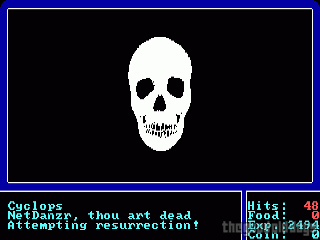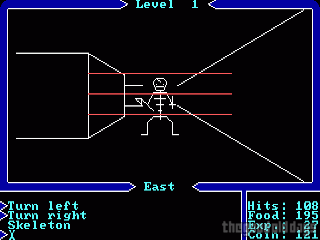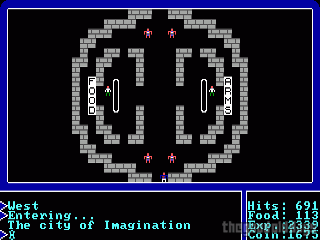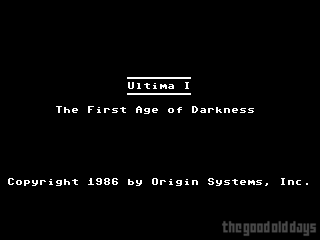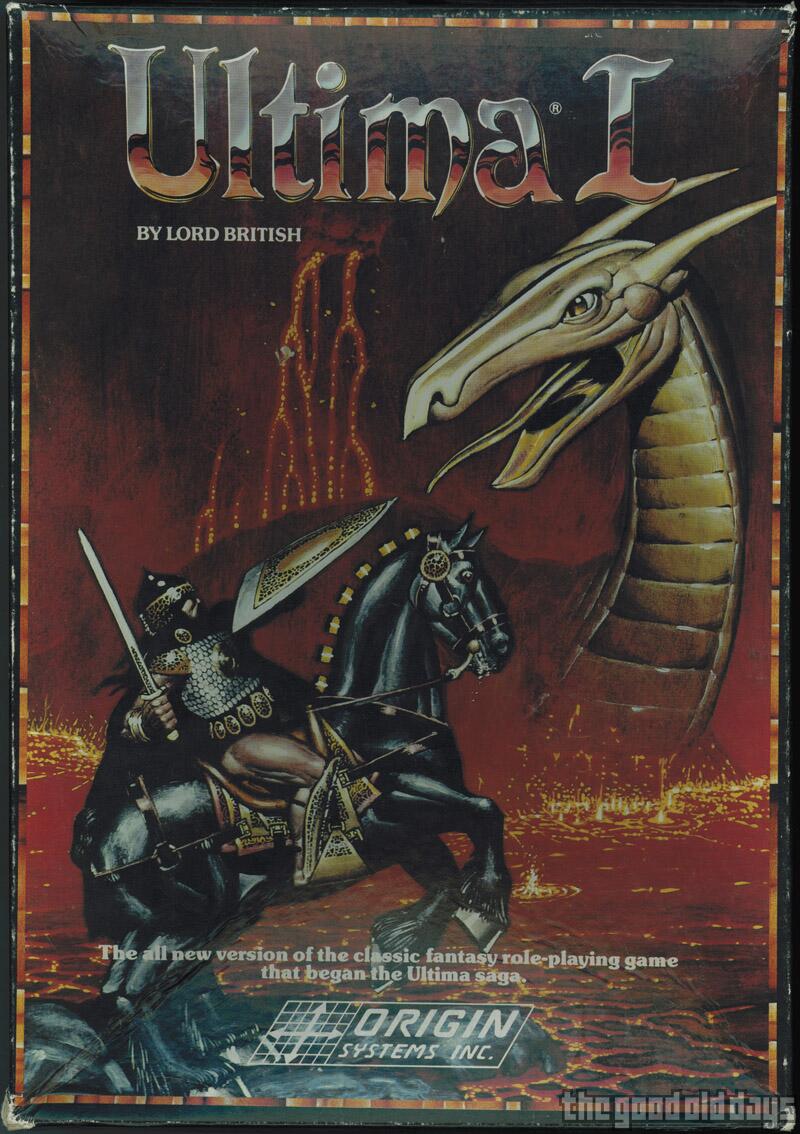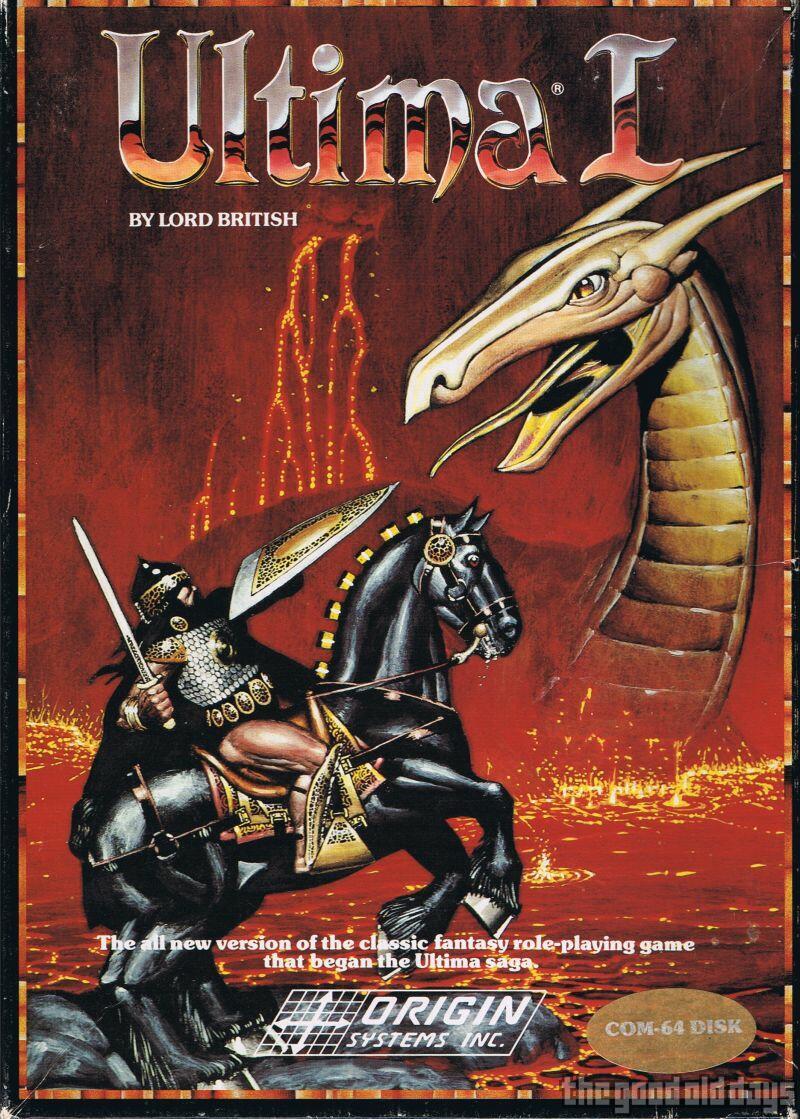Thoughts by NetDanzr (06 Jul 2006) – PC (DOS)
It was 1980, and an 18-years old kid had nothing better to do than to sit in his bedroom in Houston, TX, and type a computer program on his Apple II. From time to time, a friend was helping him out with the tedious task of hexadecimal calculations. The kid was Richard Garriott and his friend was Ken Arnold. The program they worked on was the first of its kind – a computer game called Ultima: The First Age of Darkness.
Actually, the game has been based on Garriott’s previous title, Akalabeth. Compared to Ultima, however, Akalabeth was nothing more than a technical demo. Unlike Ultima, it didn’t feature a story, music and advanced graphics. In a sense, Ultima was first. It featured a story that’s been duplicated until this day, with small modifications. It featured both a top-down and first person view. Way before other games, it had real-time combat. It was engrossing, and introduced fifty thousand paying customers (and countless others) to the wonderful world of mature computer gaming.
The power of lawyers
Even the mighty Avatar of the Ultima series would be no match for the Electronic Arts lawyers. They not only struck down commercial projects, like Ultima Underworld III that was released as Arx Fatalis, but also took aim at fan-based projects. For example, the makers of the Ultima I remake were forced to rename their game to Era. Nearly every part of the series is getting a facelift, making the EA lawyers happy to know that they wouldn’t be without work anytime soon.
Some say that the story of the game is too simplistic. I disagree; in a sense, even such modern games as Morrowind were to unable come up with anything better. For over 20 years, the same story has been duplicated over and over again; all that was changed was the amount of additional information and side quests. In this game, the evil wizard Mondain decided to take over the world. He traveled back in time, and swamped the whole world with his monsters, while he was patiently waiting till people could not handle them anymore and he’d take over as the sole ruler. He miscalculated, though. A hero (you) emerged, and after a series of quests for various kings, real-time space combat and lots of dungeon crawling, the hero managed to reach Mondain’s lair and kill him.
The main problem here is not as much the main storyline as very linear quests and a general lack of information. In the beginning, you know only what has been written in the manual, and nobody will tell you much more. In fact, until you face Mondain, you are not sure what you are doing. The kings will send you on quests that involve killing certain monsters in certain dungeons or visit certain places, but they don’t seem to be anyhow related to the main storyline. In this respect, the game gives you a little too much freedom. Figuring out what you are supposed to do takes more time and effort than actually playing.
The gameplay itself has not changed much from Akalabeth. You will still see the world from top down (albeit in much better graphics), and the dungeons didn’t change at all. They are presented in first person view and wire frame graphics. What’s really new is the improvement to towns and the interaction with people. Each town features various shops, and each castle has an assortment of people, ranging from the ruler, through prisoners, princesses, jesters, to quite tough guards. You will be able to talk to many of them on various topics, and even try to steal from shopkeepers. In addition, people’s attitudes towards you will change as you progress in the story, which adds a little authenticity to this gaming world.
Not all that glitters is gold, however. The game has some balancing issues. Probably the biggest problem is the way you gain hit points. Whenever you emerge from a dungeon, your hit point count is updated according to the number of monsters you killed. As such, even close to the beginning, you can develop a character with a few hundred hit points by simply wandering the first two levels of a dungeon for some time. To make matters worse, there are a few shortcuts in the game that will get you very powerful weapons and large amounts of gold a little too early. These shortcuts are not hidden, and stumbling upon them is just a matter of time.
However, my main gripe with the gameplay is a short sci-fi intermezzo. Many fantasy games have a strong sci-fi undertone. This trend is especially visible in the Might and Magic series, and also the later Wizardry games didn’t escape the use of blasters, hovercraft and space travel. Ultima is not only the source of this merger between fantasy and science fiction, but also the game to introduce the dreaded arcade sequences in role-playing games. In this case, you’ll be required to fly through space in a first-person perspective and shoot down a number of enemy craft. When I first played it, it took me over a day of frustration to finish this quest, and even in later replays I wasn’t much better.
To be fair, there are other positive aspects of the game. For example, it features a relatively well-developed spell system with twelve spells. The controls are very easy to use, and the graphics in the IBM remake were above average. If you were lucky enough to get your hands on the Apple IIGS version of the game (ported by Bill Heineman, published by Shareware Solutions II), you could also enjoy one of early music works of Tony Gonzales of Wolfenstein 3D fame.
All in all, Ultima was a revolutionary game. It was the first game to be aimed at a more intelligent audience – the owners of early computers, not their children. It proved that such games are viable, selling over 50,000 copies before IBM PC was even launched. The game was not only the foundation of one of the best-known gaming franchises, but also set the tone for other RPGs. The most important thing, however, is the fact that until this day, over 20 years after it was written, the game is fun to play.

